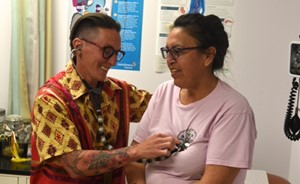Choosing a financial advocate
Who would you want to make financial decisions for you if you become unable to do this yourself? The way you name someone to do this is through a Power of Attorney (POA), and the person is usually known as your financial “attorney”. You can appoint more than one person to this role.
Your financial attorney can decide both your finances (e.g., banking or investments) and your property (e.g., real estate, vehicles). Some POAs are temporary, while others are more permanent. A lawyer or notary can help you to decide which is best for you.
“I never thought about the problems that could arise because my partner handled most of our finances. Banks, credit card companies, utilities – everything was in his name, and none of them wouldn’t speak with me when he got sick because he hadn’t named a Power of Attorney. It was one of the first things we did once he was well enough.”
Depending on where you live, if you don’t have a POA and become unable to make financial decisions, a court may appoint someone to do this for you. This might be a member of your family of origin or an ex-spouse, or it might be an official, such as a Public Guardian or Trustee. You might not want certain people you know – or a stranger who doesn’t know you – to control your finances.
POAs can play a key role in your future planning since you may have not covered expenses through your healthcare plan(s). While your financial attorney can’t legally make decisions about your healthcare (unless they’re also your healthcare advocate), they can make financial decisions that may affect your healthcare.
For example, it likely wouldn’t occur to a court-appointed person to look for or choose 2SLGBTQ+ inclusive care if you needed it. You may have strong feelings about receiving care in a way that recognizes and respects your concerns, such as having your friends be welcome to visit, or having your spouse or partner acknowledged by staff, or be able to live with you at some point.
By naming a financial power of attorney, you make your wishes clear and known to others. For example, you might be giving money to someone regularly and want this to continue. You might consider the sale of your home while your partner is living in it as a “last resort”. If the home is in your name only, planning may save them – and you – future distress or expense.
Read more
Keep in mind that if you become unable to manage your money, your financial attorney will have control over some or all of your assets. This person will be responsible for paying your bills and filing your income tax returns.
Although your financial attorney is legally bound to act in your best interests, you should pick someone that you trust, who can manage money well, and who understands and is willing to assume the responsibilities. It’s also advisable to consult with a lawyer or notary since there are different kinds of Power of Attorney.
It’s also helpful if your financial attorney is someone who knows you reasonably well since they’re more likely to make decisions as you would. If you have a spouse or partner, a friend, or someone else whom you would want to be your financial advocate, it’s worth formally naming them as your financial attorney through a POA. Otherwise, they might have to go to court to control your finances, which could take time and money and create stress.
It’s possible to name one person to act as both your financial and healthcare attorney. If you choose different people for each of these roles, it’s a good idea for them to have at least some knowledge of one another.
A lawyer or notary can help you create a POA that comes into effect only when you’re no longer able to make financial decisions. As long as you are legally competent, you can cancel your POA whenever you wish. Otherwise, it will end when you die, at which point your Executor will take over responsibility for your estate, including financial matters.
Read more
Resources
Videos
More Articles

Leaving a legacy

What does "2SLGBTQ+" mean?

Managing difficult situations

Planning ahead: Your wishes

How to be an ally

How to provide inclusive care to Two-Spirit & LGBTQ+ people

Getting the care that you need

About your grief

Choosing a healthcare advocate

Finding 2SLGBTQ inclusive care

Making an advance care plan

Making a will

Finding inclusive continuing care

Why inclusivity matters

For family, friends, and unpaid caregivers

Canadian Healthcare Bill of Rights

My Choices for Safe and Inclusive Healthcare
Featured Content

2SLGBTQ+ Canadian Healthcare Bill of Rights
Read More
MyGrief.ca Module - Grief in 2SLGBTQ+ communities
Read More
My Choices for Safe and Inclusive Healthcare
Read More
Planning for My Care
Read More
2SLGBTQ+ Knowledge Synthesis
Read More
Webinar: Improving access to respectful & inclusive care.
Read More
2SLGBTQ+ Canadian Healthcare Bill of Rights Infographic
Read More



